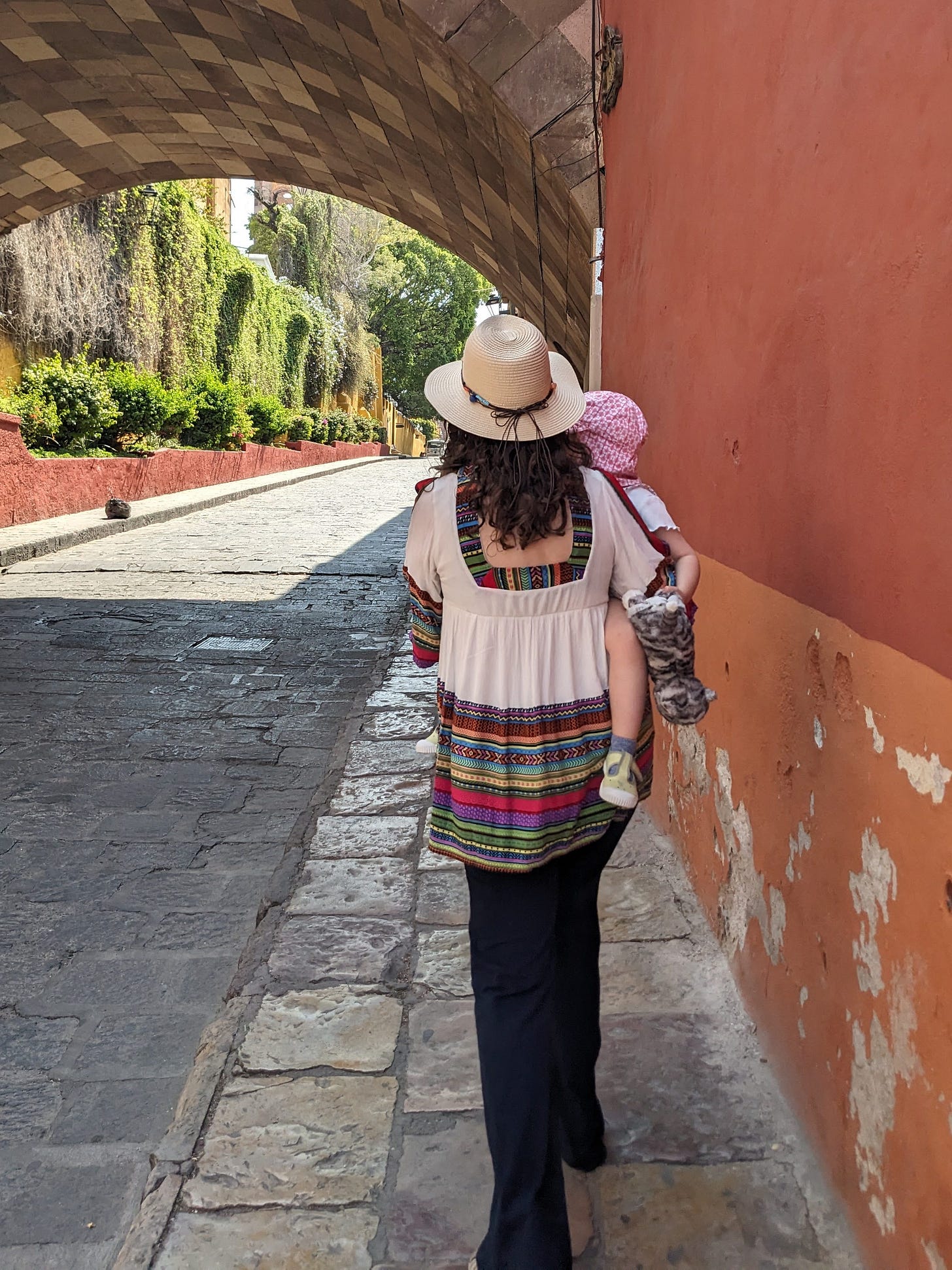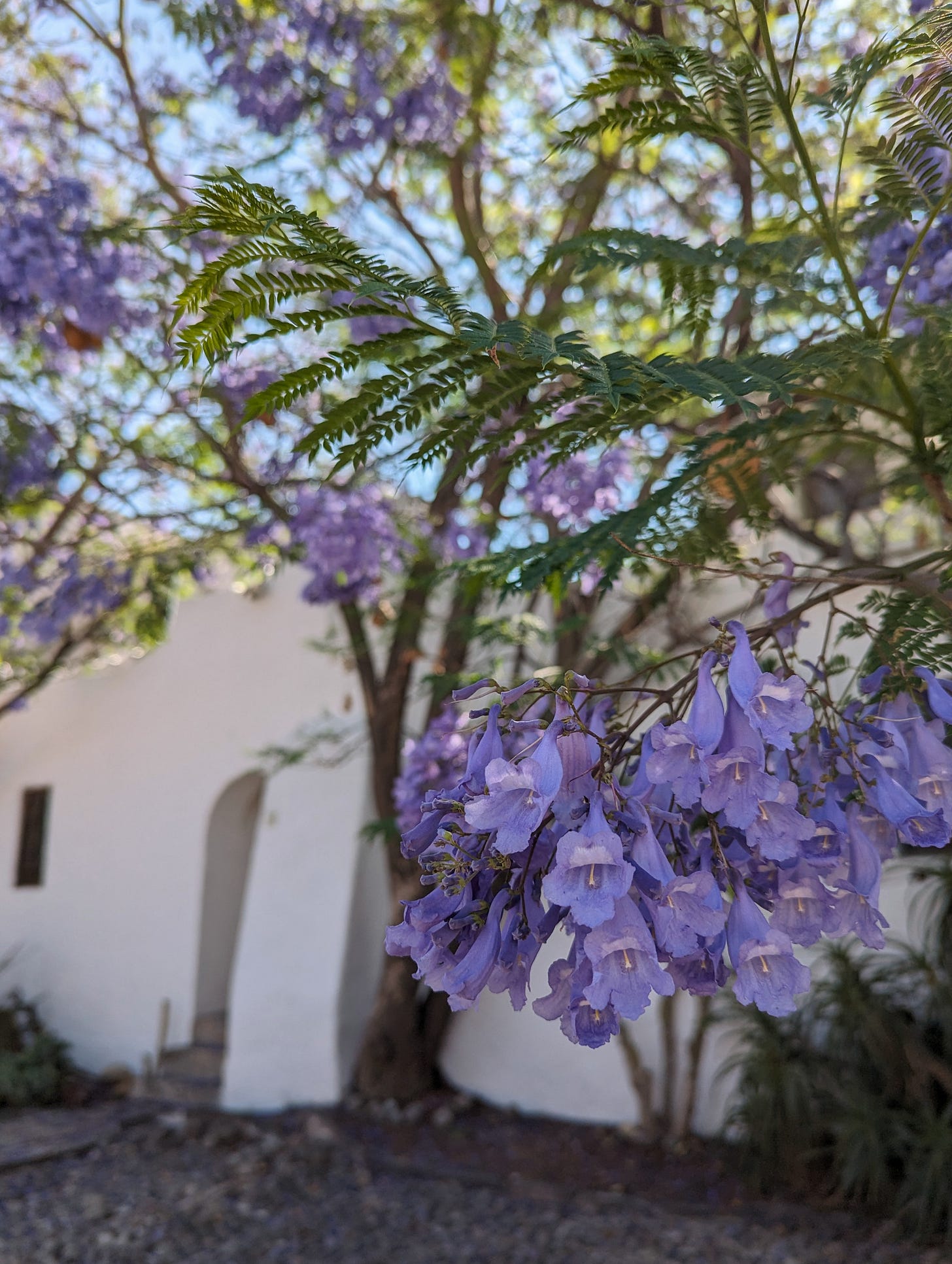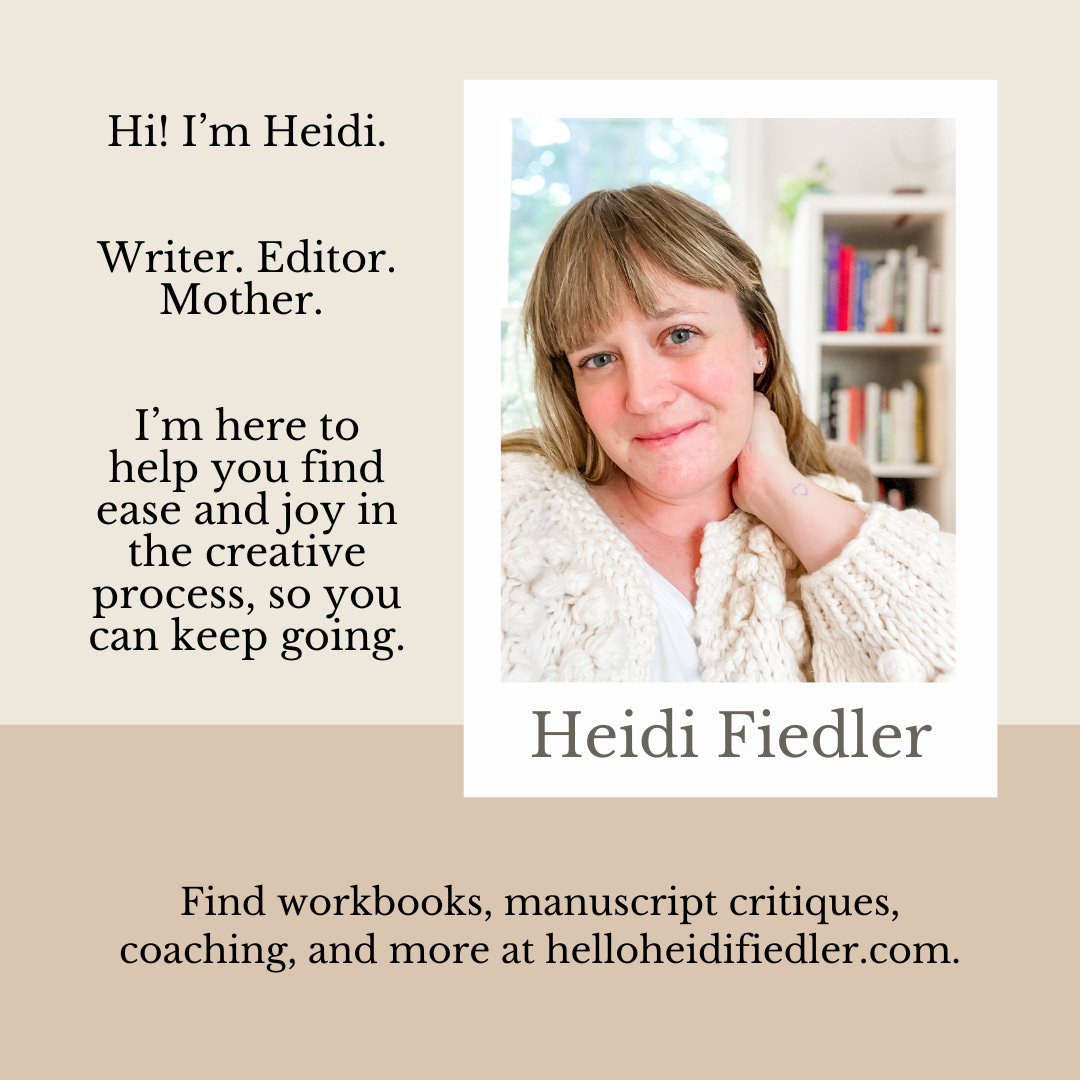How did motherhood change your creative practice?
I knew my writing would take a backseat once I had a baby. I’d heard infants are needy. Even though my cute but sinister husband hugged me from his office chair, placed his head on my stomach and said, “I wish there was a baby in there,” I told him that subject was off-limits until I finished my novel. As in most areas of life, the patriarchy prevailed and I found out I was pregnant three months later.
And except for a few glorious second-trimester months of coffeeshop writing on my oversized donut pillow, my novel has sat untouched. My poetry disappeared altogether, but like my last longterm ex-boyfriend, I miss it a lot less than I thought I would. Poetry broke my heart in a similar way, with lots of empty promises and unreturned messages, and in letting it go I feel equally freed from a dead-end relationship.
My daughter just turned two, and so did my full-time ghostwriting career. It’s the first time that writing hasn’t felt like dredging up that viscous sludge they pull out of the bottom of the ocean - laborious, sticky, anguished. Now, writing takes place in a brief window between preschool drop off and pick up, and miraculously, flows easily under someone else’s name with someone else’s voice.
There’s only one person to please - my client. And in general, this is a much more manageable task than satisfying the unattainable standards of my former MFA professors, the confused aspirations of my impossible father, or the impenetrable world of literary magazines - all uninvited voices that reside in my head. Though different than the raw imagination of my own work, I still must be creative when I am writing about the relatively uneventful birth of a grandparent’s fifth grandchild, or the loose philosophy of a successful CEO who worked hard, got lucky, and happened to invest at the right time. These stories are always interesting, but it takes a few stabs to hit the right vein.
Creativity is no longer the precious, evasive state-of-being only encountered after long walks in the woods, viny joints around a fire, or good sex. It is a muscle. A tool. A thing I can summon to pay my mortgage, feed my child, and hit a deadline. A lot of things lose their preciousness in motherhood - privacy, bodily functions, public decency - and creativity is one of those things for me. It has become functional and forgiving.
How does art enrich your life? How does being a mother enrich your art?
If I don’t write, I’m a bit of a monster. Everything feels dull. Writers are dramatic like that. We need to find the layers in experience to feel alive. I used to think I was a poet because I strung dramatic, unpunctuated observations together on a white page. Then, I thought I was a memoirist because I wrote long personal essays examining my absurd childhood and its disastrous implications. Now, I introduce myself as a ghostwriter because I’m always on the hunt for my next client. The truth is I am just a plain, old-fashioned writer. Someone who enjoys navel-gazing, self-aggrandizement, and snarky criticism of perfectly well-intentioned works of art. I write because I’m miserable if I don’t. I don’t feel like I really understand an experience until I tell a nameless, faceless audience every grueling detail.
Being a mother means in addition to the mountains of self-doubt endemic to being a writer, I am perpetually concerned with what a two-year-old will think of her mother’s career two decades from now. It is enough to be worried about being a “failed writer,” “former writer,” or “wannabe writer.” Now, I want to impress my daughter with a list of accolades that she can use as bragging rights - or therapy material - in a few decades. This may seem like an easy task given that her favorite food is applesauce sucked out of a silicone pouch, or that her favorite pastime is pulling down her pants in a public park and running away screaming, but you’d be surprised. Feeling beholden to a two year’s future sense of mysef is one of those life-altering circumstances that could either propel me to unimagined success or catapult my writing career into a minefield of Disney cliches and corporate theme songs. Only time will tell.
Since having my daughter, time has become both fleeting and precious. Time to write, time to read, time to play, time to dream. This is one of the ways in which I am deeply American - my days are judged by how I spend my time, and it is usually spent fretting about what I haven’t done or what I want to eat but don’t have in the fridge. I want my writing time to be meaningful, and I want my time without my daughter to be filled with writing. So, I struggle to do things I don’t want to do. That means there’s always unfolded laundry, dirty dogs, and an ever-growing list of ignored administrative tasks. I guess you could say my daughter helps me focus more, and somewhat surprisingly, has made me more dedicated to my writing - even if it is mostly under someone else’s name.
When do you feel most creative?
When I first had my baby, I could hardly make it to the kitchen to feed the dogs. I was definitely not one of those “bounceback” moms who strapped on their newborn, counted calories, and signed up for SoulCycle. I was more of a “ring-a-bell-and-wait-for-my-husband-to-do-it” kind of mom. My birth was hard, the recovery was harder, and I felt that my body did all it needed to do - survive.
Like many new moms, I was up every few hours struggling to breastfeed. When feedings and lactation did not line up, I found myself sitting in our dark living room alone hooked up to a hospital grade breast pump, desperate to write. I’d scribble a few notes, record a voice memo, or plan out long story lines in my head while the boisterous machine tugged at my worn nipples. In the midst of newborn chaos, I was desperate to connect with my pre-child self.
A year or so later, I remember handing my daughter off to our beloved babysitter and racing to the nearest coffeeshop. I knew I only had two feedings and one nap to access my creative ambition and write something that made me feel good. It helped me learn to draft recklessly and appreciate the stages of writing. Writing feels good. Editing feels better. Publishing feels the best. And in my new reality, each of those things had to take place in confined chunks of time.
These days, nothing brings out my creativity like a deadline. I work hard and fast when I am approaching a due date for a client or hustling to impress an editor. I’d like to say that being in nature sparks creativity, like it did in my twenties, but being in nature usually means that I’m applying sunscreen on a runaway toddler or nursing a scraped knee. I can see the trees. They’re pretty. But, I’m more concerned that she ate the last cracker and dumped her bottle of water on my socks and we’ve only been on the hiking trail for ten minutes. Plus, there’s an angry ant hill up ahead that my daughter is eyeing manically.
What’s inspiring you outside of your own genre?
Mexico. Every single thing in Mexico. The smell of pan dulce wafting down an old, colonial street. The floral overwhelm of blooming Jacarandas, Bougainvilleas, and Lavender bursting out of a single garden. Banda and reggaeton leaking out the cracked windows of public buses. Men in three piece suits stopping to wave at my wide-eyed daughter behind the glass of a cafe window. Crisp mountain air and beating high elevation sun twisting and turning cacti into towering botanical works of art. The howl of street dogs. The bat emergence from beneath my neighbor’s spanish tiles punctuating a lavish sunset each night. Mangoes, avocados, and guayabas straight from the tree.
My family and I moved to San Miguel de Allende to create more space in our lives. More time to work, more time together, more time to explore. Central Mexico is a never ending sensory onslaught of music, fragrance, and visual delight. I love watching my daughter in this new world - collecting giant jacaranda seed pods from the plaza, snatching tiny pink potatoes from the fruit stand, and waving at passing taxi drivers.
Plus, people are so nice here. I don’t know why - after years of colonization, corrupt politics, and inhumane U.S. immigration policies, you’d think they’d be cranky. But, the security guard at the grocery store grabs my daughter and makes her laugh seconds before running into a busy street. The abuelita pounding masa in the market gives her endless free tortillas, staving off a low-blood-sugar-induced meltdown. Cafe owners ask what books I’d like to see on their shelves and what kind of vegan tacos they should feature on the menu. Everyone waves, and smiles, and holds doors open, and shares their seat on the bus.
Who would you love to collaborate with? What’s a dream project for you?
I love working on projects that illuminate the intersections of history, culture, and personal memoir from the mouths of people who truly and obviously love what they do - especially if its funny. I’ve found food to be one of the best avenues to tell these stories because we all eat each other’s cuisine - your favorite meal likely originated continents away both in concept and in composition - and there is endless humor to be found in stories about food. Frijoles and flatulence. Hot sauce and horniness. Brandy and bad behavior.
My dream projects are more cookbooks, and food memoirs, because it is literally the most enjoyable kind of writing I’ve ever done. And I get to eat - a lot. I’d love to work with more foodies who are interested building equitable food systems, illuminating untold food histories, and investigating the role of food and culture in their personal lives. I really admire the work of Sana Javeri Kadri, Sara Calvosa Olson, Ethan Frisch & Ori Zohar, Alicia Kennedy, and Stephen Satterfield. Coming from an exceptionally dysfunctional family, I learned unconditional love from my animals and honor those relationships by eating mostly plant-based. So, I’d love to work with some of these inspiring plant-based chefs who bring it all together: Denise Vallejo, Brenda Beener, Chef Cola, Kate Lasky and Tomasz Skowronski, and Evanice Holz.
Outside of food, I love writing books with people who are obsessed with something - a hobby, a vocation, a lifelong pursuit - and want to educate others about it. Photographers are fun. They are dreamy and precise and have an eye for beautiful things. Mixologists are always a good time. They are endlessly imaginative and like having chatty people around. I’d love to work with more circus performers, and late night talk show hosts, and birders. And of course, moms. Because they understand if I show up five minutes late in an avocado-stained shirt with a cold cup of coffee and the wrong notebook. They don’t have time for BS and know how to get to the heart of things. Plus, they always bring snacks.
Kelsey Erin Shipman is a writer based in San Miguel de Allende, Mexico. She writes articles on food and culture, and ghostwrites books for creative professionals, business owners, and passionate hobbyists on doing what you love. Her work has appeared in USA Today, The Austin Chronicle, as well as numerous literary journals, and she served as the Writer-In-Residence at the Katherine Anne Porter Literary Center. Mother of a chihuahua, anatolian shepherd, and two-year-old girl, she’s always out of coffee and sunscreen. You can find her on Instagram @kelseyerinshipman and at kelseyshipman.com. Read her recent essay “Coke, Castor Oil & COVID” here.
If you enjoyed this post, please 💛 it so others can find it or share it with your favorite creative mothers.
PS—The fastest way to grow as a writer is to book a manuscript critique or a creative coaching session with an expert.
My clients get agents, sell books, and win awards. They also learn how to find ease and joy in the creative process, so they can keep going when life gets hard.













I just realized you’ve worked on children’s books! I’ve had three published. I’ll dm you I’m so curious what you do. : )
Great piece! I so enjoyed hearing about her life in Mexico and how it inspires her work as well.